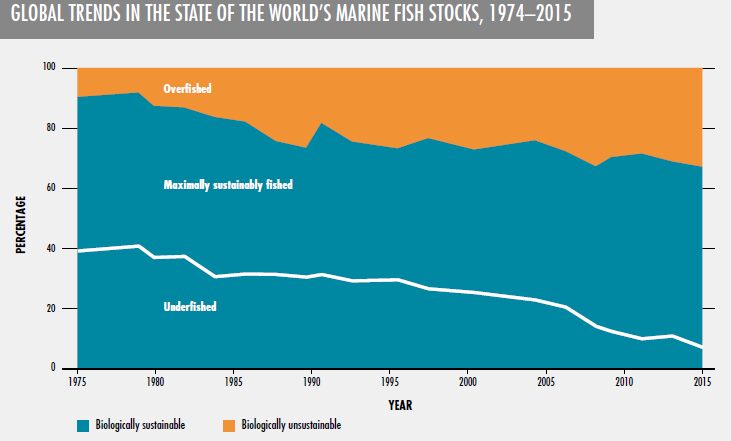UN alert: Mediterranean is world’s most overfished sea
Food security warning as one-third of global fish supply hits dangerously overfished levels
Press Release Date: July 9, 2018
Location: Madrid
Contact:
Marta Madina | email: mmadina@oceana.org | tel.: Marta Madina
A health-check report on world fisheries and aquaculture by the United Nations (UN) has revealed that one-third of global marine fish stocks are now fished at unsustainable levels and have reached ‘overfished’ status. Oceana flags particular attention to the state of the Mediterranean and Black Sea, which according to the report published today, is the world’s most overfished sea.
The 2018 State of World Fisheries and Aquaculture (SOFIA) report, published by the Food and Agriculture Organization of the United Nations (FAO) confirms a global trend toward unsustainable fishing. Thirty-three percent of global fish stocks are now overfished, a figure that is increasing year after year and which poses a threat to the marine ecosystem and food security for billions of people worldwide.
“The new report from the FAO is discouraging: it shows that the world still has a long way to go toward responsible management of our oceans. The number of overfished marine fisheries has risen over the last years. And, despite increasingly sophisticated and aggressive fishing techniques, global catch has continued to decline. This new report is only the latest data point on a disturbing trend line. Overfishing and destructive gear, habitat degradation, pollution, and short-term thinking have limited the amount of wild seafood available to humanity. And these same problems continue to threaten the health of the ocean and all the species that live there,” said Andrew Sharpless, chief executive officer of Oceana.
One of the most worrying findings from the “SOFIA” Report is the extent of the overfishing crisis in the Mediterranean and Black Sea.
“It’s confirmed. The Mediterranean Sea is the most overfished in the world, with 62% of its fish stocks now overfished and at serious and real risk of being depleted. Nobody wants a sea so familiar to many of us to have no fish for people to eat or no more jobs and livelihoods for those who depend on fishing in the region. This shocking situation must be a wake-up call for immediate political action,” said Lasse Gustavsson, executive director of Oceana in Europe. “The Mediterranean Sea needs urgent and bold action such as curbing bottom-trawling fishing, safeguarding areas where fish grow, and setting annual fish catch limits in line with scientific advice,” added Gustavsson.


